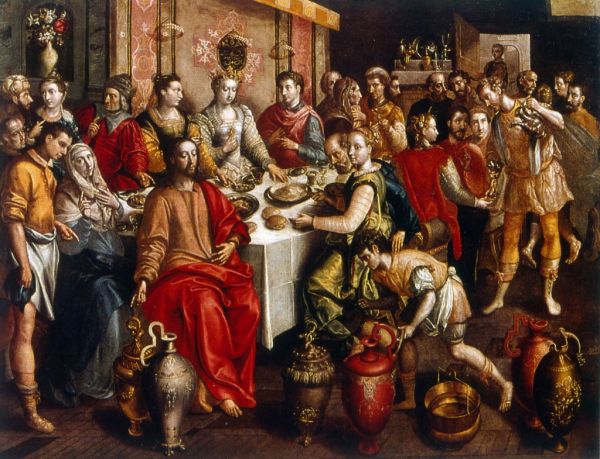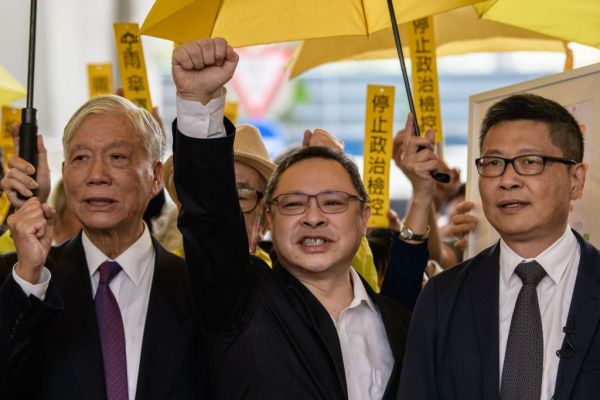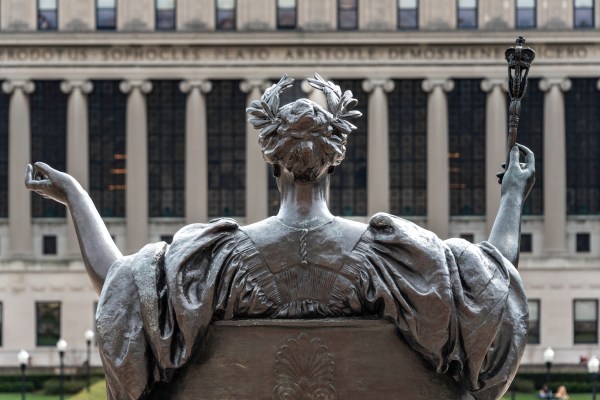In the current era of constant debate, shifting ideologies, and intense elections, it may be that holiday get-togethers can offer something more than a continuation of the same. Among people who love one another, it might also be a time of more quiet and amiable reflection about gratitude and reminiscing, a stepping back from the daily give-and-take and looking at the bigger picture. It might be a time to return to the first principles we remember as we recall the arrival of the pilgrims to our shores. It may even be an opportunity to think about how we might craft public policies on a different footing, to move us to conduct electoral politics that are both coherent and morally sound.
Our age of expediency and internet-assembled-philosophy encourages the notion that winning is the highest civic goal. It too easily results in a superficial culture that neglects the rigorous and honest thinking required to move from where we are now to where we should be: a good, fair, and prosperous people. To build a society that truly honors human dignity, we must first understand what allows human beings to flourish. Without this, how can we form intelligent, morally consistent policies that correspond to our deepest values?
The present moment presents a confusing and dramatic tension in how we think about building a free society. It is a grasping for power and political gain at the expense of everything else.
Those of us who pay close attention to the conservative-libertarian movement, which once championed a “fusionist” consensus, have seen the shift perhaps most evident in the political evolution of Vice President-elect J.D. Vance. His 2016 memoir, Hillbilly Elegy, was largely viewed as a non-political work, embodying the ideals of a virtuous society: small government, strong families, a sense of fairness and local institutions as the foundation of and initiator of social change. It was an updating of the Horatio Alger story for our time. As Vance has transitioned from author to U.S. senator, and soon the next in line to the presidency, we have detected a shift in his views toward populism, with a greater openness to state intervention. His advocacy of such, aimed at rebuilding domestic manufacturing, and his opposition to free trade deals or his proposal to use antitrust laws to break up big tech companies are examples of lessening the stress on personal responsibility and local solutions to achieve good ends in favor of government subsidies and regulatory mechanisms. This mirrors a broader trend among conservative populists overall. The point here is not that the goals of the policies are wrong, but that the means chosen bespeaks a shifting understanding of the legitimate function of government.
My point here is not so much about Vance’s odyssey as it is about how it reflects broader changes in the conservative political and moral landscape as a whole. Movements like national conservatism, populism, distributism, and Catholic integralism along with other theocratic tendencies have emerged, focusing less on individual and family autonomy and principle and more on expediency and critiques of systemic forces—particularly the power of corporations and elites. These movements blame globalization and corporate greed for economic inequality—all of which is true enough—but now there is a resort to state power to address these issues, rather than a focus on the overreach of the state itself as the main culprit underlying the problems. I’ve heard it said often that if religious traditionalists don’t win elections (and thus the power to control the levers of the state) we won’t be able to achieve the goals we want. I actually heard a nationally known pro-life speaker publicly say, “If they hit us, we hit them back harder; if they kill us, we kill them.” Yet, this reasoning stems from the belief that the most important thing needed is politics rather than the admittedly harder work of cultural and moral transformation. This trajectory ends with those who were advocates for a free and virtuous society no longer able to recognize themselves.
The rise of such populism should compel us to revisit fundamental principles about what makes a society good. We should seek to meet real human needs that are only met in free, self-governing, human communities: a sense of honor, friendship, cultural formation and reformation. Respecting human dignity requires that we not simply see everything though a political lens, with the acquisition of power as the goal and solution, but through the lens of human bonding and mutual cooperation.
At the heart of this lies a principle from my own faith tradition but that has parallels in others: subsidiarity. Though the word may sound lofty, subsidiarity is based on the commonsense idea that society is best governed at the most local level possible, at the most proximate level of social organization possible. This principle affirms that higher levels of government should only step in when lower levels—families, communities, local governments—are unable to address a particular issue. This approach protects against centralization and bureaucratic overreach, which often leads to inefficiency and a loss of personal freedom. The subsidium (help or subsidy) aids, it does not replace or absorb society into the state.
Alexis de Tocqueville observed this dynamic in action during his visit to the U.S. in the early 19th century and documented it in Democracy in America. He noted how the principles of decentralization, embodied in the American founding documents like the Federalist Papers, were reflected in the culture that promoted habits of problem-solving. This bottom-up approach fosters accountability and promotes individual freedom, avoiding the pitfalls of centralized planning and the inefficiencies of bureaucratic agencies and centralized planning.
Yet subsidiarity is not just about efficiency. It is rooted in an understanding of human nature—recognizing that while we are social beings, we are also individuals. Throughout our entire existence we are shaped by relationships, but we also possess unique and creative minds and aspirations. This delicate balance requires that humans be free to make their own choices and shape their own communities. Too much state intervention undermines this balance and stifles the natural formation of communities based on cooperation, mutual support, and shared responsibility. Basically, it fights the given of human nature, which is not moldable in the hands of technicians and politburo members or politicians. It is something that reveals the nature of things as they are, that with prudent policy making in accordance with this reality, can build societies worthy of human beings.
As sociologist Robert Nisbet explained in his 1953 book The Quest for Community, constraining power imposed from without is fundamentally different from legitimate authority accepted from within. This distinction between power and authority, which can be traced back to the teachings of Christ in Matthew 22:21 (“Render unto Caesar the things that are Caesar’s, and unto God the things that are God’s”), highlights the enduring tension between state authority and personal freedom—a tension that has shaped political thought for centuries.
For example, let us suppose that we all agree that it is a good thing that people pray and act charitably toward their neighbors. We could attempt to achieve that goal by means of power—by the making of laws or the imposition of penalties on people who do not regularly pray or assist the poor or through higher taxes to achieve that end. Alternatively, we can strive to build a culture that inspires an interior compunction with people to pray and give to charity. This is done by the example of others and by their moral praise of our conformity and even, at times, by their shaming of us for our failures. It can be done in the pulpit and other means of reinforcement. The former method may (though not consistently) result in an outward conformity, while that latter will effect a deeper, moral and radical transformation of the values people and society holds and lives.
Pope Benedict XVI articulated a vision for a healthy secularism that respects religious freedom while acknowledging the positive role of religion in public life. This approach rejects both theocracy and radical secularism, instead advocating for a society in which religious and secular realms coexist and inform one another. A balanced secularism allows religious voices to contribute to moral discourse without fear of marginalization by running schools, proposes a philosophy of life, aiding the poor, etc. In doing so, it fosters a dialogue between faith and reason that enriches the common good.
Yet, Benedict warns against seeing the state as the whole of society or even its principal expression. Here is what he says in his encyclical, Deus Caritas Est:
The state which would provide everything, absorbing everything into itself, would ultimately become a mere bureaucracy incapable of guaranteeing the very thing which the suffering person—every person—needs: namely, loving personal concern. (no. 28)
Ultimately, these principles—subsidiarity and balanced secularism—are critical to building a society that honors human dignity. Much of our civic momentum seems to be to drift toward centralized power on every side, but returning to these foundational ideas is key to renewing our political culture. The American experiment, with its unique combination of divided power and individual liberty, is too precious to be abandoned to irrationality and polarization, bureaucracy and politicization.
It falls to us to preserve this legacy, ensuring that it is handed down, intact, to future generations. In doing so, we will not only preserve the unique insights of the American experiment so inspiringly instantiated, if not in the specific historical details of the first Thanksgiving, certainly in the traditions and values that have emerged from it. We will build a culture of generosity and authentic inclusion, fostering a society where human beings can truly flourish—free, responsible, and empowered to build communities that reflect the highest ideals of justice and virtue.






Please note that we at The Dispatch hold ourselves, our work, and our commenters to a higher standard than other places on the internet. We welcome comments that foster genuine debate or discussion—including comments critical of us or our work—but responses that include ad hominem attacks on fellow Dispatch members or are intended to stoke fear and anger may be moderated.
With your membership, you only have the ability to comment on The Morning Dispatch articles. Consider upgrading to join the conversation everywhere.